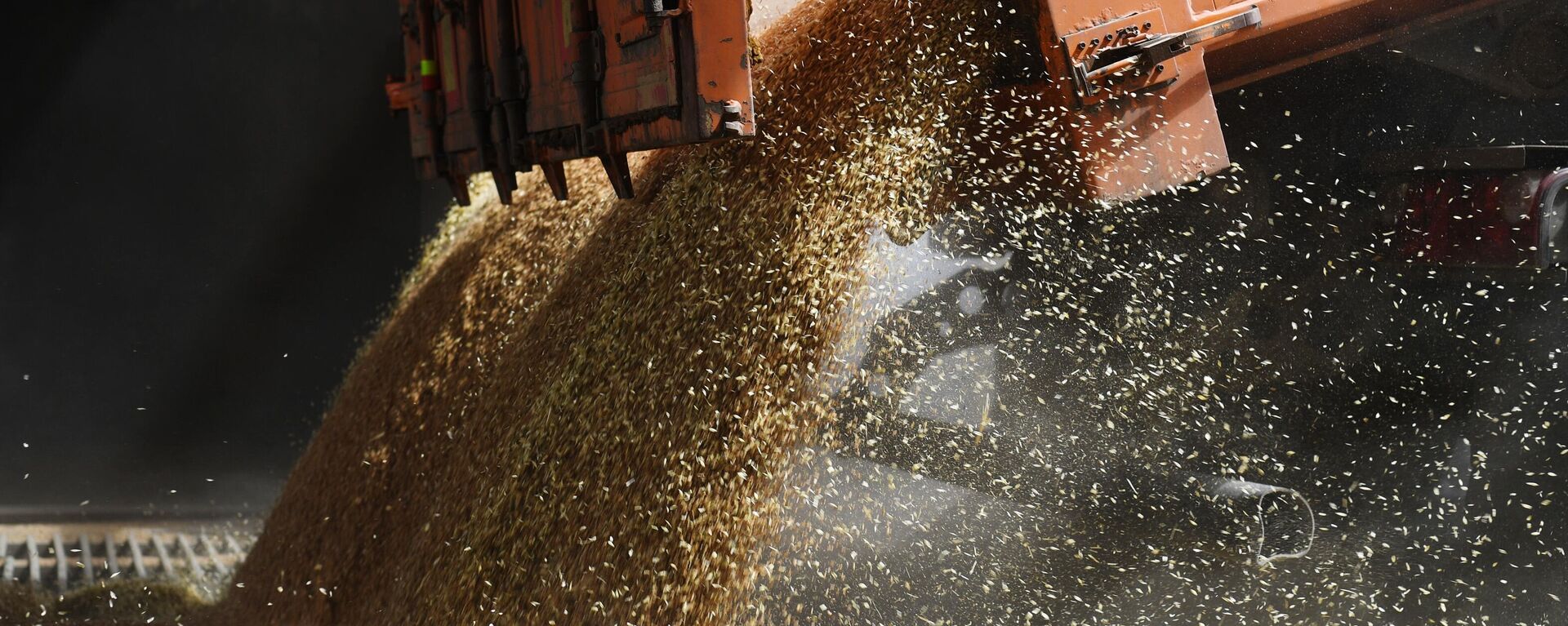https://en.sputniknews.africa/20240513/zimbabwe-poised-to-become-africas-fertilizer-hub-says-president-mnangagwa-1066514934.html
Zimbabwe Poised to Become Africa's Fertilizer Hub, Says President Mnangagwa
Zimbabwe Poised to Become Africa's Fertilizer Hub, Says President Mnangagwa
Sputnik Africa
This follows a decision by the AU African Fertilizer and Soil Health Summit, held last week in Nairobi, to revitalize and strengthen the African Center for... 13.05.2024, Sputnik Africa
2024-05-13T12:57+0200
2024-05-13T12:57+0200
2024-05-13T12:57+0200
sub-saharan africa
emmerson mnangagwa
moussa faki
zimbabwe
nairobi
african union (au)
summit
fertilizers
agreement
food security
https://cdn1.img.sputniknews.africa/img/07e8/03/1a/1065775806_0:14:3000:1702_1920x0_80_0_0_3e5146517792807f7246224e24ecf706.jpg
Zimbabwe is on track to become a major fertilizer production, research, and training center for Africa following the African Union's decision to revitalize the Harare-based African Center for Fertilizer Development, President Emmerson Mnangagwa told local media.The center aims to support the continent's fertilizer sector and coordinate projects at national, regional, and international levels, focusing on the adaptation, testing, and demonstration of improved fertilizer production methods.President Mnangagwa, speaking to media after the AU summit, highlighted the significant benefits Zimbabwe stands to gain from this initiative. He underscored that AU is determined to leverage the center's potential to reduce dependence on the global North for fertilizer imports, which cost the continent billions of dollars annually.While acknowledging that Zimbabwe, like many other African nations, has lagged in optimal fertilizer use and soil management, President Mnangagwa expressed optimism about the future. He emphasized the need for specialized expertise to ensure the center's effectiveness.The Nairobi summit, which focused on agricultural development, served as a valuable learning experience. It highlighted the importance of understanding soil health and adopting tailored approaches to soil management for improved yields.African Union Commission chairperson Moussa Faki Mahamat lamented the continent's reliance on fertilizer imports, despite having a dedicated center in Zimbabwe.The summit culminated in a 10-year action plan outlining concrete steps for African leaders and stakeholders to rebuild soil health, enhance yield responses, and boost profitability through new policies and investments.This summit builds upon the 2006 Abuja Declaration on Fertilizer for the Africa Green Revolution, a continental strategy aimed at reversing the trend of low productivity in African soils.
https://en.sputniknews.africa/20240320/zimbabwe-ready-to-collaborate-with-russia-to-create-grain--fertilizer-hub-for-africa-minister-says-1065653976.html
zimbabwe
nairobi
southern africa
Sputnik Africa
feedback@sputniknews.com
+74956456601
MIA „Rossiya Segodnya“
2024
Muhammad Nooh Osman
https://cdn1.img.sputniknews.africa/img/07e7/04/0a/1058467512_0:0:1280:1280_100x100_80_0_0_ec723833bcbfcaed2e21952965ad99e4.jpg
Muhammad Nooh Osman
https://cdn1.img.sputniknews.africa/img/07e7/04/0a/1058467512_0:0:1280:1280_100x100_80_0_0_ec723833bcbfcaed2e21952965ad99e4.jpg
News
en_EN
Sputnik Africa
feedback@sputniknews.com
+74956456601
MIA „Rossiya Segodnya“
Sputnik Africa
feedback@sputniknews.com
+74956456601
MIA „Rossiya Segodnya“
Muhammad Nooh Osman
https://cdn1.img.sputniknews.africa/img/07e7/04/0a/1058467512_0:0:1280:1280_100x100_80_0_0_ec723833bcbfcaed2e21952965ad99e4.jpg
emmerson mnangagwa, moussa faki, zimbabwe, nairobi, african union (au), summit, fertilizers, agreement, food security , southern africa
emmerson mnangagwa, moussa faki, zimbabwe, nairobi, african union (au), summit, fertilizers, agreement, food security , southern africa
Zimbabwe Poised to Become Africa's Fertilizer Hub, Says President Mnangagwa
Muhammad Nooh Osman
Writer/Editor
This follows a decision by the AU African Fertilizer and Soil Health Summit, held last week in Nairobi, to revitalize and strengthen the African Center for Fertilizer Development, based in Zimbabwe. Established in the 1980s, the center's mission is to promote fertilizer research and production across Africa. But the center has long been dormant.
Zimbabwe is on track to become a major fertilizer production, research, and training center for Africa following the African Union's decision to revitalize the Harare-based African Center for
Fertilizer Development, President Emmerson Mnangagwa told local media.
The center aims to support the continent's fertilizer sector and coordinate projects at national, regional, and international levels, focusing on the adaptation, testing, and demonstration of improved fertilizer production methods.
President Mnangagwa, speaking to media after the AU summit, highlighted the significant benefits Zimbabwe
stands to gain from this initiative. He underscored that AU is determined to leverage the center's potential to reduce dependence on the global North for fertilizer imports, which cost the continent billions of dollars annually.
"It has been there. It was an AU decision a long time back," said the president. "It has been dormant, in my view, but now the rest of Africa has realized that it is necessary to capacitate it, that is to provide funding from the AU to make sure that it provides services for which it was created and I am happy that we host the continental centre."
While acknowledging that Zimbabwe, like
many other African nations, has lagged in optimal fertilizer use and soil management, President Mnangagwa expressed optimism about the future. He emphasized the need for specialized expertise to ensure the center's effectiveness.
"We are behind, as I was listening to what is required, we always thought that application of fertiliser is normal, year after year. It is not like that, the soil itself gets aged, fertiliser cannot continue to be the same, it must continue to be improved, depending on the climate and soil of a particular region.," he said.
The Nairobi summit, which focused on agricultural development, served as a valuable learning experience. It highlighted the importance of understanding soil health and
adopting tailored approaches to soil management for improved yields.
African Union Commission chairperson Moussa Faki Mahamat lamented the continent's reliance on fertilizer imports, despite having a dedicated center in Zimbabwe.
“Regarding fertiliser, it constitutes a critical input for productivity if properly used [...] Some African countries produce fertiliser but we depend mostly on imported fertiliser, making it very expensive for our farmers yet the African Centre for Fertiliser Development based in Zimbabwe has been in existence since the 1980s,” Faki said.
The summit culminated in a 10-year action plan outlining concrete steps for African leaders and stakeholders to rebuild soil health, enhance yield responses, and boost profitability through new policies and investments.
This summit builds upon the 2006 Abuja Declaration on Fertilizer for the Africa Green Revolution, a continental strategy aimed at reversing the trend of low productivity in African soils.



